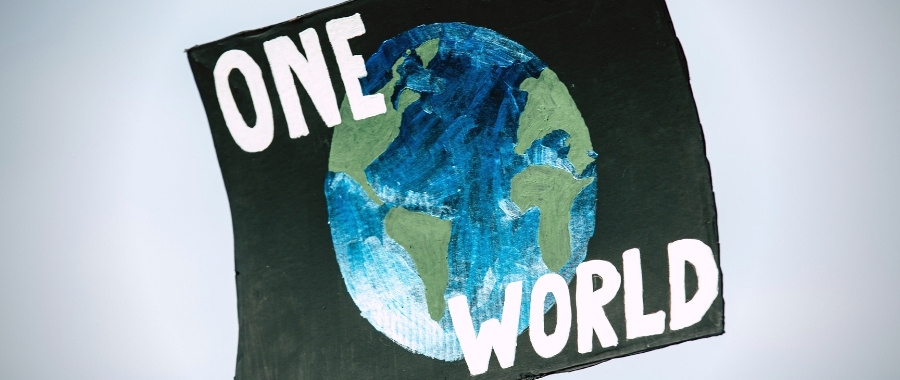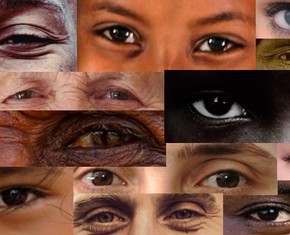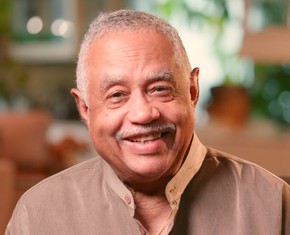The views expressed in our content reflect individual perspectives and do not represent the authoritative views of the Baha'i Faith.
Each year since its founding in 1945 the United Nations and its member countries have observed October 24th as UN Day – so today the planet’s nations celebrate 74 years of global peace.
War has not ended, of course. Several regional, proxy and civil wars now rage in various places. But importantly, humanity has had no world-encompassing, multi-national global wars since 1945. UN Day recognizes one of the primary reasons why: because the close of World War II prompted national leaders to try and prevent another unspeakable tragedy like the one the world had just experienced.
That cataclysmic war began 80 years ago in 1939 and ended 74 years ago, which means that only a relatively small number of elderly people who witnessed its carnage remain alive today. In the 21st century, most of us only know World War II as some distant conflict we read about in history books or see in grainy black-and-white documentaries.
So, let’s briefly review. During the six years of that horrendous global war, somewhere between 70 and 85 million people died – the vast majority of them civilians. World War II decimated entire countries and regions, reducing great cities to rubble. The deadliest conflict in human history, it produced mass genocides like the Holocaust; saw the first and only use of nuclear weapons; generated premeditated campaigns of murder from strategic bombing, starvation and rampant disease; and brought to near-fruition the specter of a world dominated by totalitarian and dictatorial regimes. It destroyed entire economies, massacred whole populations, and forcibly redrew the world’s boundaries and borders, which have since led to many civil and regional wars in places like the Middle East.
Historians call World War II the greatest human tragedy in history.
The Baha’i teachings clearly warned humanity about the advent of both World Wars. Baha’u’llah, writing in the mid-1800s, admonished the world’s kings and rulers to disarm, come together in one global Parliament to ensure collective security, and cease all wars:
Compose your differences, and reduce your armaments, that the burden of your expenditures may be lightened, and that your minds and hearts may be tranquillized. Heal the dissensions that divide you, and ye will no longer be in need of any armaments except what the protection of your cities and territories demandeth. Fear ye God, and take heed not to outstrip the bounds of moderation, and be numbered among the extravagant. – Baha’u’llah, Gleanings from the Writings of Baha’u’llah, pp. 250-251.
We cherish the hope that through the earnest endeavours of such as are the exponents of the power of God – exalted be His glory – the weapons of war throughout the world may be converted into instruments of reconstruction and that strife and conflict may be removed from the midst of men. – Baha’u’llah, Tablets of Baha’u’llah, p. 23.
In an address he gave in Sacramento, California in 1912, two years before World War I, Abdu’l-Baha said:
The issue of paramount importance in the world today is international peace. The European continent is like an arsenal, a storehouse of explosives ready for ignition, and one spark will set the whole of Europe aflame, particularly at this time when the Balkan question is before the world. … Therefore, the greatest need in the world today is international peace. The time is ripe. It is time for the abolition of warfare, the unification of nations and governments. – Abdu’l-Baha, The Promulgation of Universal Peace, p. 375.
Then, in the mid-1930s Shoghi Effendi, the Guardian of the Baha’i Faith, presciently wrote:
The disastrous failure of both the Disarmament and Economic Conferences; the obstacles confronting the negotiations for the limitation of Naval armaments; the withdrawal of two of the most powerful and heavily armed nations of the world [Germany and Japan] from the activities and membership of the League of Nations; the ineptitude of the parliamentary system of government as witnessed by recent developments in Europe and America; the inability of the leaders and exponents of the Communist movement to vindicate the much-vaunted principle of the Dictatorship of the Proletariat; the perils and privations to which the rulers of the Totalitarian states have, in recent years, exposed their subjects – all these demonstrate, beyond the shadow of a doubt, the impotence of present-day institutions to avert the calamities with which human society is being increasingly threatened. – Shoghi Effendi, The World Order of Baha’u’llah, pp. 189-190.
Ultimately, the belligerent militaristic policies of the world’s most powerful nations made the two World Wars inevitable. Within the span of three awful decades, those two wars resulted in the deaths of more than a hundred million people.
When World War II formally ended on September 2nd, 1945, a cry went up all over the world: no more! Just seven weeks later, on the 24th of October, 1945 in New York City, many of the world’s largest nations ratified the Charter of the United Nations, and launched humanity’s second major attempt at forming a world Parliament – a nascent endeavor meant to at least partially realize the “unification of nations and governments” the Baha’i teachings put forth as the primary permanent solution to the world’s wars and conflicts.
By far our most successful attempt at global unity so far, this second collective try at worldwide negotiation and cooperation has not always succeeded, but it has stopped many famines, averted potential wars, protected human rights, helped former colonies gain independence, resolved refugee crises, played a major role in the global response to climate change and other environmental issues, provided a forum for nations and their leaders to gather and consult, and given the world a 74-year period of hope. After all, we’ve had no world wars since the UN was created. Starting with just 51 member nations, the U.N. now has 193 – the overwhelming majority of the world’s 196 countries.
While Baha’is certainly recognize that the United Nations still has a long way to go before it equally represents all nations and all people, and understand that the structure of the United Nations doesn’t currently meet that egalitarian ideal, more than a century ago Abdu’l-Baha urged everyone to work toward attaining Baha’u’llah’s vision of a united and peaceful world:
All nations will join in adopting the teachings of Baha’u’llah revealed more than fifty years ago. In His Epistles He asked the parliaments of the world to send their wisest and best men to an international world conference which should decide all questions between the peoples and establish universal peace. This would be the highest court of appeal … but when we have the interparliamentary body composed of delegates from all the nations of the world and devoted to the maintenance of agreement and goodwill, the utopian dream of sages and poets, the parliament of man, will be realized. – Ibid., p. 388.
That noble global goal, the central Baha’i principle of universal democracy and a world Parliament – what the Baha’i teachings call “the daystar of the firmament of true civilization and the cause of the glory, the advancement, the well-being and the success of all humanity” – constitutes the primary objective of all Baha’is. That’s why Baha’is commemorate UN Day, in the hope that we can go beyond the old nationalistic antagonisms that have plagued our planet and its populace for so long.
In fact, the Baha’i teachings condemn the outworn institution of nationalism and the contentious and warlike national policies it engenders, which still threaten all humanity. Rather than continuing down the same uncivilized and barbaric path that brought us two destructive World Wars during the 20th century, Baha’is believe, all the people of the planet must unite:
True civilization will unfurl its banner in the midmost heart of the world whenever a certain number of its distinguished and high-minded sovereigns – the shining exemplars of devotion and determination – shall, for the good and happiness of all mankind, arise, with firm resolve and clear vision, to establish the Cause of Universal Peace. They must make the Cause of Peace the object of general consultation, and seek by every means in their power to establish a Union of the nations of the world. They must conclude a binding treaty and establish a covenant, the provisions of which shall be sound, inviolable and definite. They must proclaim it to all the world and obtain for it the sanction of all the human race. This supreme and noble undertaking – the real source of the peace and well-being of all the world – should be regarded as sacred by all that dwell on earth. – Abdu’l-Baha, The Secret of Divine Civilization, p. 64.
















Comments
Sign in or create an account
Continue with Googleor